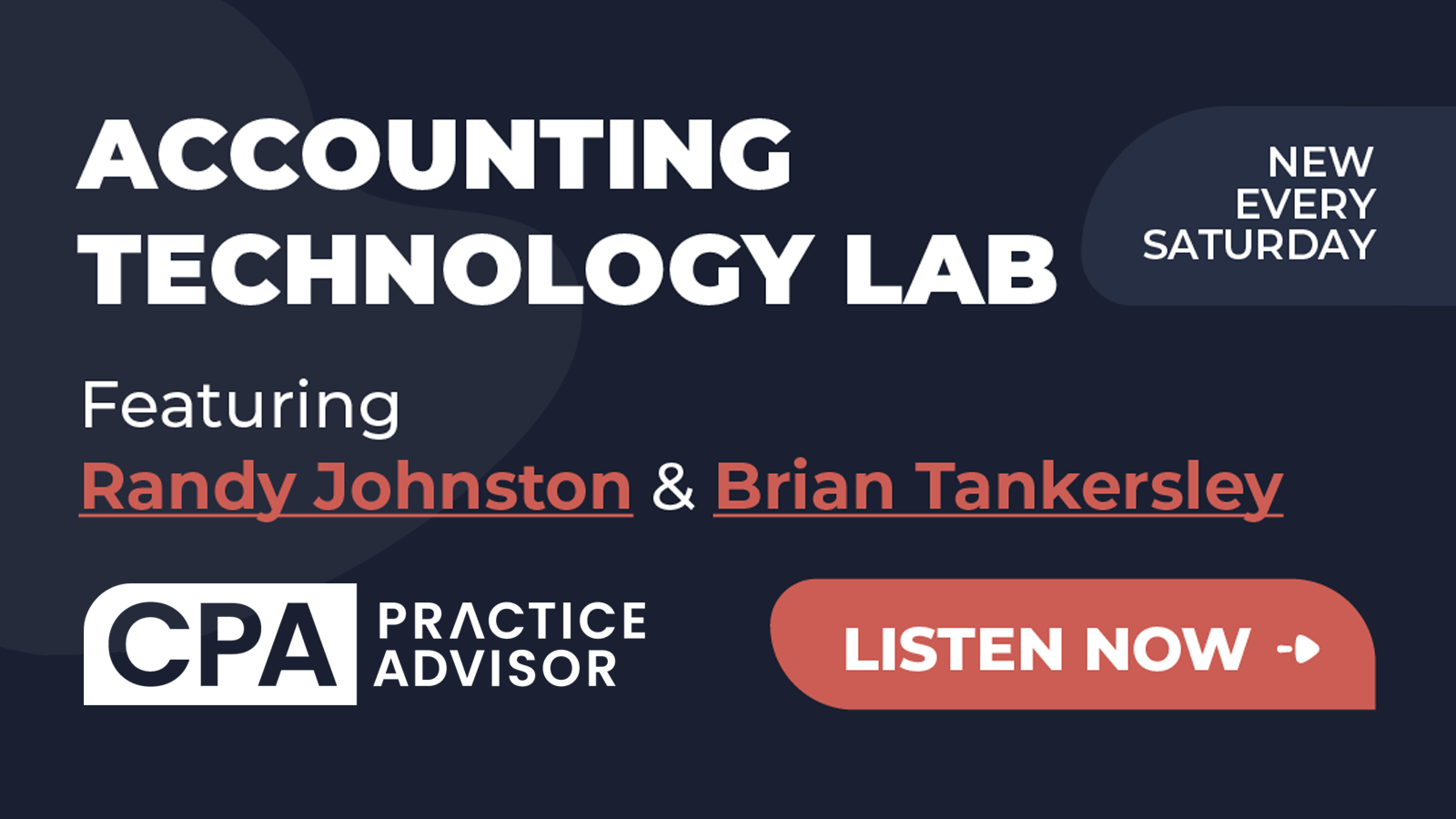Technologists Randy Johnston and Brian Tankersley, CPA, discuss technologies presented at the recent CCH Connections user conference.
Use the podcast player below to listen.
Transcript (Note: There may be typos due to automated transcription errors.)
SPEAKERS
Randy Johnston, Brian F. Tankersley, CPA.CITP, CGMA.
Welcome to the technology lab presented by CPA practice advisor with your hosts, Randy Johnston and Brian Tankersley.
Randy Johnston 00:08
Welcome to Technology Lab. I’m Randy Johnston out of Hutchinson, Kansas with my friend and cohort and CO presenter Brian Tankersley out in Knoxville, Tennessee. Now, as it turns out, Brian and I get the privilege of being guest and presenters at lots of different conferences. And recently we were at the Wolters Kluwer cch users conference in Orlando, a fine event with lots of innovation shown, and lots of people that we got to talk to about their experience. So Brian, I know that you and I both went through the AI Lab and several other pieces, but there were some pretty big announcements. So what were the key observations you had from the user conference this year?
Brian F. Tankersley, CPA.CITP, CGMA 00:54
You know, I think I’m going to pull an audible here and go to the AI lab specifically. Because they they did have that AI Lab was actually quite interesting. And I noticed that many of the senior execs are kind of hanging out there because I think they think they want to be close to what people are thinking about AI and kind of what’s going on there. Just to reminder here that with AI, one of the major concerns is privacy. And so Wolters Kluwer cch is actually using a private model, as opposed to using chat GPT or something like that, that has a more a more shared share, like kind of privacy policy. So I think you have, you know, they’re they’re working on that. But one of their statements was that over 50% of Wolters Kluwer revenue is from products which include AI. And so the thesis statement I would give you there is that even though Chet GPT is new, AI most of most assuredly isn’t. And in fact, much of the technology that you think of today, as optical character recognition, where we take data that’s been scanned, and we turn it into you into structured data, like we, you know, we scan a trust statement turned into a spreadsheet, that technology, it really is benefiting from AI that has been developed over the last 1520 years. Okay, some of it longer than that. But the accuracy, accuracy increase that you see today comes from that, just like when we think about Aliette, say, I’m not going to say it out loud, because I don’t want to set it off in any of your any of your computers. But we think about that, or Sri or many of the other virtual assistants, they’re much better today than they were, they were in the future. Now we’re in the past Sorry, sorry. Now, when we look at this, the CCH AI lab, they actually went through and showed some things. And they talked a little bit about client relationship assistance and schedule optimization and benchmarking and firm specific guidance. They also talked about some global search features, specifically in the research products on AI, global search, and AI powered live feed, some contextual q&a, and then revenue scoring. As we look at this, though, they actually had five things that they had us, they had us actually go through and look at one of them was an AI powered search where we had a junior person went through and summarize data and actually, the AI actually wrote a client memo related to that topic, just kind of kind of a plain language, backgrounder. There was another one that that wrote a collection letter to a client. And and you actually, they actually said in there, there was going to be a stern collection letter, and it was stern, okay. There’s a thing on firm guidance and benchmarking compared to other firms in the area. And that one got a lot of the folks I talked to a little bit nervous, because it you know, if I mean, I guess it’s because I live in a smaller Metro, you know, if I lived in New York, New York, New Jersey, and that tri state area, I’d probably feel okay about being benchmark against firms that are within, let’s say, 100 miles of me, but here, that’s a whole different thing, you know, in flyover country who Randy and I live. So, you know, again, it might have to be a 500 or even 1000 mile ready radius to make that work, but it’s quite interesting. We also had some, some stuff that generated some firm and client scorecards out of practice. And again, some, some things in here on real time reporting of firm data. So that, you know, they had some very interesting labs that you went through, and I think there was, there was a lot of good stuff in there. One of the things that we’ve noted as we look across the industry, this was one of the first times I’ve seen actual real AI. That was been deployed in the area in an area that practicing CPA would use. You know, I’ve seen situations where people in demos feed bank statements into chat GPT to turn it into CSV values. And I would just say that from a privacy perspective, that’s beyond a nightmare. And I think it’s bordering on a privacy breach. So, so the problem with AI as one, what are you going to do with it? And two? How are you going to deal with the privacy implications of using it? And so I think that we need to be very careful with some of this public facing consumer AI like Chet GPT, but the WK lab was very good. I think it’s a good evolution of their product line of these these potential additions that they’re looking at. And I think it is, I think, you know, we’re, I think a lot of the hype of chat GPT has really driven us on AI, where, where we think AI is going to do everything we want it to do, it’s going to make us all thinner, it’s going to make it’s going to cure cancer, it’s going to make our teeth wider, it’s going to make us more attractive to members of the opposite sex. And I think the reality of the lab is that it is going to be an evolution, not a revolution. So, but we have to learn to trust it first. So that’s kind of my take on the AI Lab. Randy Yeah, so
Randy Johnston 06:21
I appreciate that. And I was fascinated to listen to you, because we did not go through that lab together. I went through with practitioners and other analysts. And I had the good fortune of driving. And we were very fussy about providing the feedback on the different areas. But we like you immediately saw that comparison thing as a possible privacy issue. So I think many people would have pointed that out. But the fact of the matter is, the thoughtfulness in the way the AI was integrated the usefulness inside the CCH access platform, the integration over into the Microsoft 365 platform. It was a pretty darn good deployment for a prototype mock up. And, you know, I think that they can get there pretty quick explanation, Brian is spot on. The improvements in legacy technologies like OCR are notable. And one of the other tricks that happened with the team mate document linker that we’ve talked about in another technology lab. And many of the OCR products across. Wolters Kluwer cch family, is they’re now doing OCR two ways. So you know, some of our friends are from Ohio, where you can have chili, you know, to a three way four way? Well, you get OCR two ways here. And, you know, they then compare the two results, and that increases the confidence in them. So, I am very optimistic about routine things that are going to be easier for us and more accurate for us based on these innovations.
Brian F. Tankersley, CPA.CITP, CGMA 08:06
And one thing that I thought was interesting that has evolved since that conference was chat, thus far, Microsoft copilot, which was the great white hope for all of us. And we were all thinking, you know, this is going to solve the AI problem. November 1, when it becomes quote, generally available, close quote, what is generally available, if you have 300 users and are willing to pay 300 a month, okay, so on and commit to an annual contract for the low low price of $108,000. A year you can have Microsoft co pilot today, as long as you have Microsoft 365 83 or 85 in 300 licenses or more. So, you know, the thing, the thing I would say here is that I thought it was good that well, first off, I think it was good, that cch kind of kind of throttled things back and didn’t didn’t go completely wide open in it. Because it could have been very problematic. Because right after the conference, President Biden came out with an executive order on AI classifying it as as traded arms under the ITAR regulations, which means that our ability to do that across borders is significantly less. So you know, using that AI in Microsoft co pilot, for example, could potentially turn into a problem if it was used by an outsource employee or an offshore employee now, because we didn’t get all the all the i’s dotted and T’s crossed under ITAR. So I think there is a there’s kind of a hold on a lot of the AI stuff right now, in response to those current events that I’m reporting on here the second weekend in November as we record this,
Randy Johnston 09:51
so you know, the ITAR piece and the frankly executive order on Ay ay ay you know, is the Let’s see, I’m gonna get my dates wrong. But I think that was done on Monday, the 30th. And, of course, the G seven meeting in Bletchley, when the G seven approved global AI policies was on Wednesday, the first, as Brian and I analyze those, we’ll talk about those more, but they’re very, very important from an AI regulatory piece, not to mention, the privacy regulations that are changing so much that in the presentations I’ve done over the last few weeks, I’ve claimed that CPA firms are going to have to add a privacy platform to be compliance with all the new compliant with all the new privacy regulations that are out there. Because we’re gonna go from five states to 13 to 22, you know, kind of like we did with data breach reporting, but you know, back onto the CCH user conference, then, of course, access engagement was released. And, but there were some fairly interesting restrictions in terms of what the product would be doing in this new world. And that was a bit surprising to me, because in effect, I think it restricted the capabilities fairly notably, you know, among those restrictions, are not being able to do consolidations. And, you know, I think the most interesting quote that you told me about I did not hear was that access has engagements released, but it’s not going to be ready for big firms until mid 2024. So
Brian F. Tankersley, CPA.CITP, CGMA 11:35
and that was a, by the way, that was, that was a cch employee that made that statement. So you know, and it was in a session on, on the conversion to access engagement and conversion process. So I think they as much as they want you to go to access engagement today, they also realized that there’s some functionality gaps that you need to watch out for.
Randy Johnston 12:01
And those functionality gaps were pretty interesting, because, you know, having more than one trial balance in an engagement or being able to do interim engagements, fun trial balances, and having more than one text grouping list, and a few others are part of the issues. So while we would like to recommend that, you know, you may want to try the new access engagement, because you’d like to get all the cloud, if you’ve got very complex engagements, it may not be the deal for you yet, you know, the PCR version of this may be as far as you can really take it. But if you’re a fairly aggressive group running cch engagement and doing prep company review and audit, probably not right now. But you know, that doesn’t change that doesn’t change my position, Brian, you’ve heard me say this for two years, it’s going to be the summer of 24, before most of these new generation platforms are strong enough to use and if you’re an auditor, you have to do it, you know, in conjunction with peer review, here’s
Brian F. Tankersley, CPA.CITP, CGMA 13:09
well, and I would also say that, that I don’t, that doesn’t mean that isn’t forestall or prohibited, a simplified pilot on a smaller job. So you can get your feet wet with the platform and understand it, if you want to move to x, if you want to start moving access engagement. I think a pilot project, you know, if you wanted to do something and you were you wanted to be in a position for the back half of 24 to run out at wide open, maybe a pilot project on some simple jobs is exactly the way to go to to get that rolling. You know, these, when you’re switching something as big as an engagement platform, you really it really needs to be right. And what I would what I would suggest to you is that the list I have from the Randy’s referring to that came from the conference, I think that there may be individual features that your firm relies upon that are not on that list that maybe should be for your firm. So I think regardless of when you implemented a pilot, a phased in approach is an important way to do it, just so you make sure that you don’t jump off the cliff and have 20 people that can’t work across 10 jobs, because there’s a function gap and you have to roll back 10 jobs instead of one because of a problem.
Randy Johnston 14:34
Well, you know, just getting closer because I know our times getting where we maybe should wrap this tech lab, Brian. Kathy row had a pretty significant promotion, leading the professional market now of how to Dallas and the integration across tax engagement, practice management, the research tools and so forth. I think Wolters Kluwer and the CCH team have a pretty strong vision of what they’ve got to do to make the platform really feel more integrated. And you know, the performance in cch access being generally improved, make sense the expansion improvements in the CCF H access collaboration suite gives that single portal little more teeth and so forth. So overall pleased with what I saw in Orlando, pleased that we spent the time to be there. And you know, it is one of the conferences every year that if you are a Wolters Kluwer cch customer, we think it is worth the money to go meet the people that manage these products and other users on the products as well. So any parting closing or closing thoughts here, Brian?
Brian F. Tankersley, CPA.CITP, CGMA 15:51
Well, they did expand the the CCH access collaboration suite. They added a tool for beneficial ownership, which we will talk about or have talked about in another Tech Tech Lab that we have. I would just say that I think Kathy row is a worthy successor to to that role that she’s in now. I think she’s a worthy successor to Jason marks. And you know, I think about Teresa McIntosh and Mike sabattus that have all sat in that chair, leading that segment of cch and, you know, Jim McGinnis, too. I think that I think she’s as talented of an executive, as I have seen in this industry in some time. And I’m looking for good things out of cch.
Randy Johnston 16:43
Yeah, makes great sense. Well, we always appreciate every moment you spend with us in the technology lab, will talk to you again as we cook up something new for you all the best. Thank
16:53
you for sharing your time with us. We’ll be back next week with a new edition of the technology lab, brought to you by CPA practice advisor
== END ==
Thanks for reading CPA Practice Advisor!
Subscribe Already registered? Log In
Need more information? Read the FAQs


